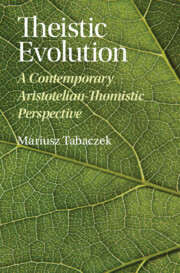Book contents
- Theistic Evolution
- Theistic Evolution
- Copyright page
- Dedication
- Epigraph
- Contents
- Figures
- Tables
- Acknowledgments
- Abbreviations
- Introduction
- 1 Metaphysics of Evolutionary Transitions
- 2 Essentialist and Hylomorphic Notion of Species and Species Transformation
- 3 Natural Selection, Teleology, and Chance in Evolution
- 4 Aquinas’s Account of Creation
- 5 Aquinas and Evolution
- 6 Evolution and Creation
- 7 Concurrence of Divine and Created Causes in Evolutionary Transitions
- 8 Theological Anthropogenesis and Evolution
- General Conclusion
- Bibliography
- Index
General Conclusion
Published online by Cambridge University Press: 19 October 2023
- Theistic Evolution
- Theistic Evolution
- Copyright page
- Dedication
- Epigraph
- Contents
- Figures
- Tables
- Acknowledgments
- Abbreviations
- Introduction
- 1 Metaphysics of Evolutionary Transitions
- 2 Essentialist and Hylomorphic Notion of Species and Species Transformation
- 3 Natural Selection, Teleology, and Chance in Evolution
- 4 Aquinas’s Account of Creation
- 5 Aquinas and Evolution
- 6 Evolution and Creation
- 7 Concurrence of Divine and Created Causes in Evolutionary Transitions
- 8 Theological Anthropogenesis and Evolution
- General Conclusion
- Bibliography
- Index
Summary
General conclusion summarizes the entire project, restating its principal objectives and achievements. (1) It emphasizes that evolution does not oppose or contradict the classical Aristotelian-Thomistic philosophical and theological view of reality. (2) It stresses the importance of the constructive proposal of metaphysics of evolutionary transitions, which takes into account the interplay of chance and teleological order in speciation. (3) It refers to the importance of the distinction between creation and divine governance of the universe, where the evolutionary origin of the new living beings belongs to the latter category and not to the former. (4) Finally, it emphasizes the relevance of Aquinass view of divine action as applied to the notion of divine concurrence in evolutionary transitions. All these aspects contribute to the contemporary Aristotelian-Thomistic model of theistic evolution developed in the volume. The research presented in it proves that, despite a certain dose of skepticism toward classical philosophy and theology, the longstanding legacy of the Aristotelian-Thomistic tradition remains vigorous and ready to enter a vivid and fruitful conversation with contemporary philosophy and science.
Keywords
- Type
- Chapter
- Information
- Theistic EvolutionA Contemporary Aristotelian-Thomistic Perspective, pp. 278 - 280Publisher: Cambridge University PressPrint publication year: 2023

